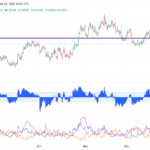BENGALURU: Taiwanese shares tanked to a one-month low on Monday with the Taiwanese dollar leading losses among other subdued Asian currencies, while China’s central bank cut key interest rates in a surprise move to boost consumer confidence amid shaky growth.
Taiwan stocks slumped as much as 3.2% at 22,130.9, its steepest percentage loss since April 19, after concerns around trade disruptions, including further curbs by Washington on semiconductor sales to China capped risk appetite. The Taiwanese dollar followed suit to retreat 0.4%, its lowest since mid-March 2016.
The US dollar index, which measures the greenback against a basket of major currencies, marginally eased 0.1% to 104.3 by 0414 GMT after US President Joe Biden announced an end to his reelection campaign.
In Southeast Asia, the South Korean won fell 0.2%, while the Indonesian rupiah and the Philippine peso lost 0.3% and 0.1%, respectively.
In Taiwan, the declines in the benchmark were largely led by technology firms and local chip stocks, with TSMC, Asia’s most valuable listed company, having lost over 2%.
About 90% of the world’s most advanced semiconductors are produced in Taiwan, largely through TSMC – the world’s largest producer and a major supplier to tech giants Apple and Nvidia.
Stocks in Taiwan marked their heaviest weekly drop in three months, though, the benchmark is the best performer in the region having added over 24% in value so far this year.
“But, on an overall basis, the Taiwan stock market has been performing quite well, so perhaps a recent weakness could also be that investors are taking profits off the table, given that in the coming months, there will be more volatility with US elections in November,” Lloyd Chan, Senior Currency Analyst at MUFG said.
In China, the central bank surprised markets by lowering a key short-term policy rate to 3.35% from 3.45% to boost confidence in the world’s second-largest economy that is verging on deflation and faces a prolonged property crisis.
The Chinese yuan was largely unchanged and stocks in Shanghai dropped 0.7% after the news did little to prop up investor sentiment in Southeast Asia’s largest trading partner.
The Singapore dollar and shares traded flat with investor focus now turning to an inflation print due on Tuesday followed by a policy meeting by the Monetary Authority of Singapore on Wednesday.
Equities in Asia were largely mixed with those in Kuala Lumpur and Seoul losing over 1% each, while shares in Manila and Jakarta adding over 0.3%.
Malaysia will report its inflation reading for June on Wednesday.





















